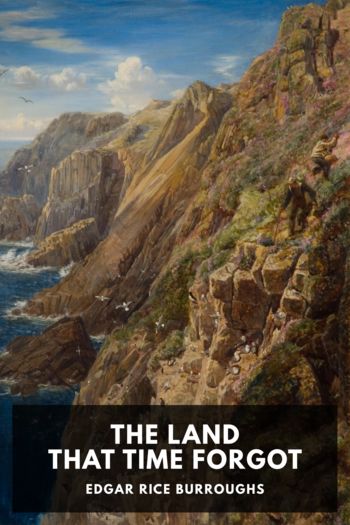South!, Ernest Shackleton [good books to read in english TXT] 📗

- Author: Ernest Shackleton
Book online «South!, Ernest Shackleton [good books to read in english TXT] 📗». Author Ernest Shackleton
Stevens and his companions made a careful survey of their position and realized that they had serious difficulties to face. No general provisions and no clothing of the kind required for sledging had been landed from the ship. Much of the sledging gear was also aboard. Fortunately, the hut contained both food and clothing, left there by Captain Scott’s Expedition. The men killed as many seals as possible and stored the meat and blubber. June 2 brought a welcome addition to the party in the form of the men who had been forced to remain at Hut Point until the sea-ice became firm. Mackintosh and those with him had incurred some risk in making the crossing, since open water had been seen on their route by the Cape Evans party only a short time before. There were now ten men at Cape Evans—namely, Mackintosh, Spencer-Smith, Joyce, Wild, Cope, Stevens, Hayward, Gaze, Jack, and Richards. The winter had closed down upon the Antarctic and the party would not be able to make any move before the beginning of September. In the meantime they overhauled the available stores and gear, made plans for the work of the forthcoming spring and summer, and lived the severe but not altogether unhappy life of the polar explorer in winter quarters. Mackintosh, writing on June 5, surveyed his position:
“The decision of Stenhouse to make this bay the wintering place of the ship was not reached without much thought and consideration of all eventualities. Stenhouse had already tried the Glacier Tongue and other places, but at each of them the ship had been in an exposed and dangerous position. When this bay was tried the ship withstood several severe blizzards, in which the ice remained in on several occasions. When the ice did go out the moorings held. The ship was moored bows north. She had both anchors down forward and two anchors buried astern, to which the stern moorings were attached with seven lengths of wire. Taking all this into account, it was quite a fair judgment on his part to assume that the ship would be secure here. The blizzard that took the ship and the ice out of the bay was by no means as severe as others she had weathered. The accident proves again the uncertainty of conditions in these regions. I only pray and trust that the ship and those aboard are safe. I am sure they will have a thrilling story to tell when we see them.”
The Aurora could have found safe winter quarters farther up McMurdo Sound, towards Hut Point, but would have run the risk of being frozen in over the following summer, and I had given instructions to Mackintosh before he went south that this danger must be avoided.
“Meanwhile we are making all preparations here for a prolonged stay. The shortage of clothing is our principal hardship. The members of the party from Hut Point have the clothes we wore when we left the ship on January 25. We have been without a wash all that time, and I cannot imagine a dirtier set of people. We have been attempting to get a wash ever since we came back, but owing to the blow during the last two days no opportunity has offered. All is working smoothly here, and everyone is taking the situation very philosophically. Stevens is in charge of the scientific staff and is now the senior officer ashore. Joyce is in charge of the equipment and has undertaken to improvise clothes out of what canvas can be found here. Wild is working with Joyce. He is a cheerful, willing soul. Nothing ever worries or upsets him, and he is ever singing or making some joke or performing some amusing prank. Richards has taken over the keeping of the meteorological log. He is a young Australian, a hard, conscientious worker, and I look forward to good results from his endeavours. Jack, another young Australian, is his assistant. Hayward is the handy man, being responsible for the supply of blubber. Gaze, another Australian, is working in conjunction with Hayward. Spencer-Smith, the padre, is in charge of photography, and, of course, assists in the general routine work. Cope is the medical officer.
“The routine here is as follows: Four of us, myself, Stevens, Richards, and Spencer-Smith, have breakfast at 7 a.m. The others are called at 9 a.m., and their breakfast is served. Then the table is cleared, the floor is swept, and the ordinary work of the day is commenced. At 1 p.m. we have what we call ‘a counter lunch,’ that is, cold food and cocoa. We work from 2 p.m. till 5 p.m. After 5 p.m. people can do what they like. Dinner is at 7. The men play games, read, write up diaries. We turn in early, since we have to economize fuel and light. Night-watches are kept by the scientific men, who have the privilege of turning in during the day. The day after my arrival here I gave an outline of our situation and explained the necessity for economy in the use of fuel, light, and stores, in view of the possibility that we may have to stay here for two years. … We are not going to commence work for the sledging operations until we know more definitely the fate of the Aurora. I dare not think any disaster has occurred.”
During the remaining days of June the men washed and mended clothes, killed seals, made minor excursions in the neighbourhood of the hut, and discussed plans for the future. They had six dogs, two being bitches without experience of sledging. One of these bitches had given birth to a litter of pups, but





Comments (0)